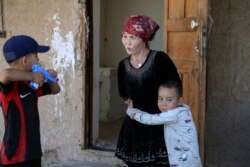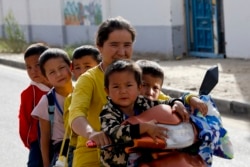The Chinese government is taking extreme measures to cut birth rates among Uyghurs and other Muslim ethnic minorities.
At the same time, it is urging some of the country’s Han majority to have more children, the Associated Press has found.
A small number of ethnic Uyghur and Kazakh women have spoken out about forced birth control methods in recent years. But a new investigation by the Associated Press has found that the treatment is far more common and systematic than once suspected.
AP reporters used government numbers, state documents and information from 30 people who had been detained or knew someone who had been detained in camps in western China.
Government officials often order physical examinations of minority women to learn if they are pregnant, the AP reports. In some cases, officials also force such pregnancies to be ended through medical operations called abortions. And, they order birth control, like intrauterine devices (IUDs) to be used by minority women to prevent pregnancies.
The population control measures are backed by mass detention, both as a threat and as a punishment for failure to follow orders. Having too many children is a major reason people are sent to detention camps, the AP found.
Parents who have three or more children are taken away from their families unless they can pay huge fines. Police raid homes to search for hidden children.
After Gulnar Omirzakh, a Chinese-born Kazakh, had her third child, the government ordered her to get an IUD -- a device put inside the uterus to prevent pregnancy.
Two years later, in January 2018, four officials in military clothes came to her home. They gave Omirzakh, the poor wife of a detained vegetable trader, three days to pay a $2,685 fine for having more than two children. If she did not, they warned, she would join her husband and a million other people of ethnic minorities in internment camps.
“To prevent people from having children is wrong,” said Omirzakh. “They want to destroy us as a people.”
The birth control campaign has created an environment of fear around having children. Across Xinjiang, birth rates fell nearly 24 percent just last year — compared to 4.2 percent nationally, government numbers show.
The hundreds of millions of dollars the government puts into birth control measures has changed Xinjiang from one of China’s fastest-growing areas to among its slowest in just a few years. That information comes from new research by China expert Adrian Zenz.
“This kind of drop is unprecedented,” Zenz said. “This is part of a wider control campaign to subjugate the Uighurs.”
China’s foreign ministry calls the AP report false and says the government treats all ethnicities equally and protects the legal rights of minorities.
“Everyone, regardless of whether they’re an ethnic minority or Han Chinese, must follow and act” as the law demands, said ministry spokesman Zhao Lijian when asked about the AP story.
Under China’s former ‘one child’ policy, officials had long urged or forced pregnancy prevention methods and even abortion on Han Chinese. But ethnic minorities were permitted two children, and three if they lived in rural areas.
Under President Xi Jinping, those rules have changed. In 2014, soon after Xi visited Xinjiang, the region's top official said it was time to put in place “equal family planning policies” for all ethnicities.”
In the following years, the government declared that instead of just one child, Han Chinese could now have two and three in Xinjiang’s rural areas, just like minorities.
State-supported experts in China have warned that large rural religious families were behind the bombings, knifings and other attacks that the Xinjiang government blamed on Islamic terrorists.
Outside experts say the birth control campaign is part of a wider government effort to weaken Uyghur identity and culture. Adults are subjected to political and religious re-education in camps. Children face similar treatment in orphanages.
“It’s genocide, full stop,” said Joanne Smith Finley, a Uyghur expert who works at Newcastle University in Britain. “It’s not immediate, shocking, mass-killing on the spot type genocide, but it’s slow, painful...genocide.”
Fifteen Uyghurs and Kazakhs told the AP they knew people detained or jailed for having too many children. Some received many years in prison as punishment.
Government data showed that of 484 camp detainees listed in Karakax county in Xinjiang, 149 were there for having too many children. That made it the most common reason for holding people.
Women in detention camps are forcibly given IUDs and what appear to be pregnancy prevention vaccines, former detainees say. Women are also required to attend classes on how many children they should have.
Seven former detainees told the AP that they were force-fed birth control pills or injected with fluids, often with no explanation. Many reported feeling tired or sick after. The women said they stopped getting their periods. After being released and leaving China, some went to get medical exams. They were told they were sterile -- or no longer able to get pregnant.
It is not clear what former detainees were injected with. However, the AP got records from a Xinjiang hospital that suggest pregnancy prevention injections are a common family planning measure.
Dina Nurdybay, a Kazakh woman, was detained in a camp that separated married and unmarried women. The married women were given pregnancy tests, Nurdybay said, and forcibly given IUDs if they had children. She did not get the device because she was unmarried and childless.
One day in February 2018, Nurdybay said, a Uyghur woman in the same cell had to give a speech admitting to what guards called her “crimes.” When a visiting official looked through the iron bars of their cell, the woman said in Mandarin Chinese, “I gave birth to too many children. It shows I’m uneducated and know little about the law.”
Another woman, Gulbakhar Jalilova, confirmed that pregnant detainees in her camp were forced to have abortions. She also met doctors and medical students who were detained for helping Uyghur women avoid punishment and give birth at home.
Looking back, Omirzakh considers herself lucky.
She was able get the money to pay the fine but was left deep in debt. For the next year, she attended classes with other wives of men detained for having too many children. She and her children lived with two local party officials sent to spy on them. When her husband was finally released, they fled for Kazakhstan.
The IUD is still inside of her. It now causes her extreme back pain. For Omirzakh, it is a daily reminder of everything she has lost -- and of the women she left behind.
“People there are now terrified of giving birth,” she said. “When I think of the word ‘Xinjiang,’ I can still feel that fear.”
I'm John Russell.
And I'm Ashley Thompson.
The Associated Press reported this story. Ashley Thompson adapted it for VOA Learning English. Caty Weaver was the editor.
_______________________________________________________________
Words in This Story
internment - n. the act of putting someone in a prison for political reasons or during a war
regardless - adv. without being stopped by difficulty, trouble, etc.
orphanage - n. a place where children whose parents have died can live and be cared for
reminder - n. something that causes you to remember or to think about something







